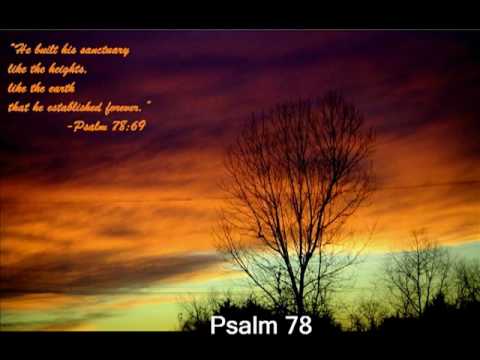
MANY NAMES OF GOD
Russell cites Psalm 78 along with several others as influenced by the Song of the Sea at Exodus 15. This psalm has composition date of the late eighth century BCE, a date “following the fall of the Northern Kingdom.” Thus, Psalm 78 may have been reworked during Hezekiah’s reign, based on the Song, created centuries earlier.
Psalm 78 contains the verse that opens this present work regarding the utterance of “dark sayings from on old” ( חידת chiydah), a reference evidently to allegorical stories, or myths. The “old” qualification suggests pre-Israelite and largely Canaanite myths. After this introduction comes a detailed summary of the Exodus story (starting at Ps 78:12ff).
Oddly enough, Moses is never named in this Exodus psalm, as was the case with the pre-exilic prophets.
GOD’S 5 NAMES
In Psalm 78, it is not Moses but the Lord God who splits the rock for water and does other major acts of the Exodus. God is named in Psalm 78 as;
1 יהוה Yĕhovah/YHWH;
2 ‘ אל el/El;
3 ‘ אלהים elohiym/Elohim;
4 ‘ עליון elyown/Elyon; and
5 ‘ אדני Adonay/Adonai,
comprising major god epithets and pre-Yahwist deities.
Most of the time, the word for “God” is El. The name YHWH is employed only in two places (78:4, 78:21).
CANAANITE GOD EL
Hence, this text appears to be the remake of a Canaanite composition exalting the high god El and interpolated to favor the southern kingdom of Judah, as opposed to the Israel of the north.
The Psalm does not mention Moses, Aaron or any other supposedly historical personages of the Exodus tale! Psalm 78 does mentions Jacob, Joseph, Ephraim and Judah, these latter southern ones raised above the former three northerners.
The Psalm 78 is based apparently on Jacob’s purported sojourn in Egypt and the domination of the southern Israelites or Judahites over the northern kingdom, especially the Ephraimites.
In any event, there is no indication in Psalm 78 of any “historical Moses,” despite the fact that the text provides a detailed summary of the Exodus story.
It would appear that the creators of the Moses myth used texts like Psalm 78 and the Song of the Sea to compose their foundational and fictional epic centuries later. The writers created a made up “patriarch” to accomplish the miraculous tasks attributed to God’s doings. Hence, the psalm speaks of “dark sayings of old,” possibly denoting pre-Israelite Canaanite scriptures and pre-Mosaic core folklore.